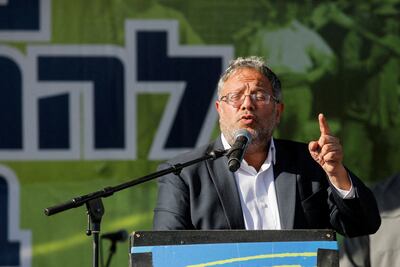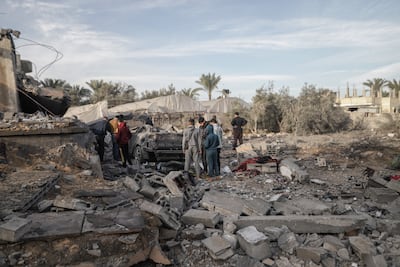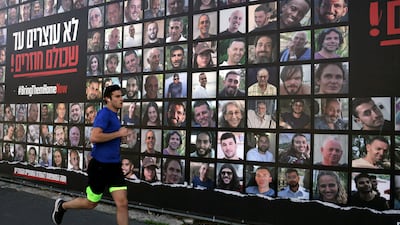Live updates: Follow the latest on Israel-Gaza
Israel was on tenterhooks on Wednesday as a second hostage deal with Hamas appeared closer than ever, raising the prospect of an end to one of the most traumatic crises in the region’s history.
If fully realised, the three-part deal could free all 98 hostages taken from Israel, living and dead, and end the Gaza war, in which more than 46,700 Palestinians have been killed and the vast majority of the strip’s population displaced.
Despite Israeli public opinion surveys long showing a preference for a deal to release the captives, there has been vocal opposition to one throughout the process and wider unease about the concessions Israel would have to make to secure an agreement, which include the release of Palestinian detainees held on terror charges and significant Israeli withdrawal from the strip without having secured a decisive defeat of Hamas.
The most vocal opposition came from far-right National Security Minister Itamar Ben-Gvir. As reports indicating progress have mounted since the beginning of the week, Mr Ben-Gvir, who has consistently favoured a heavy military approach in Gaza over negotiations with Hamas, led the charge against a deal, calling on his far-right political ally Finance Minister Bezalel Smotrich to leave the government if a deal is reached. Mr Ben-Gvir earlier boasted that he had prevented a similarly “terrible” deal on a number of occasions during the past year.

In response, Mr Smotrich said on X on Wednesday that the war should go on, but remained ambiguous on whether he would support or oppose the deal. Israeli news outlet Haaretz reported late on Wednesday afternoon that Mr Smotrich had concluded a meeting with Prime Minister Benjamin Netanyahu and Defence Minister Israel Katz.
Amir Avivi, a former Israeli general, said there is “no right or wrong” when it comes to support for a deal and that an agreement is more “a matter of what we prioritise at this specific moment”.
“As we enter this deal, Israel has to come up with a new strategy about how to defeat Hamas,” he added. "This is a long-term process. Gaza is a ticking bomb. Diffusing it is going to take many years.
“What’s happening now is Hamas is rebuilding itself faster than we’re destroying them." He said he believes the Trump administration in the US will be much more open to new Israeli proposals on how to defeat the group.
Carmit Palty Katzir, who had one family member killed and two taken hostage during the Hamas-led October 7 attacks, called for a deal to be passed, saying her story is a “very sad example of the consequences of what might happen when you’re able to rescue hostages on time, but delay”, in reference to her mother, who died soon after her release in the first truce deal of November 2023.
“We had a chance to tell her how much we loved her and for her to meet her daughters and grandkids," she said. "There are so many people we can still save. We have to save them."

A social worker, Ms Palty Katzir, whose father was killed on October 7 and whose brother was killed in captivity in Gaza, was part of planning efforts potentially to receive the latest round of hostages, who are expected to be in far worse condition than those released during the first deal.
Dr Amir Blumenfeld, a physician who works on treating and rehabilitating Gaza war hostages, said “every system in the body is damaged due to stays in captivity like this, especially in tunnels”.
“After 15 months we pretty much expect many illnesses, physical and mental, from everyone, no matter who it was before what their shape or medical condition,” he added. “I call every one of them a humanitarian case that needs to be released as soon as possible.”


